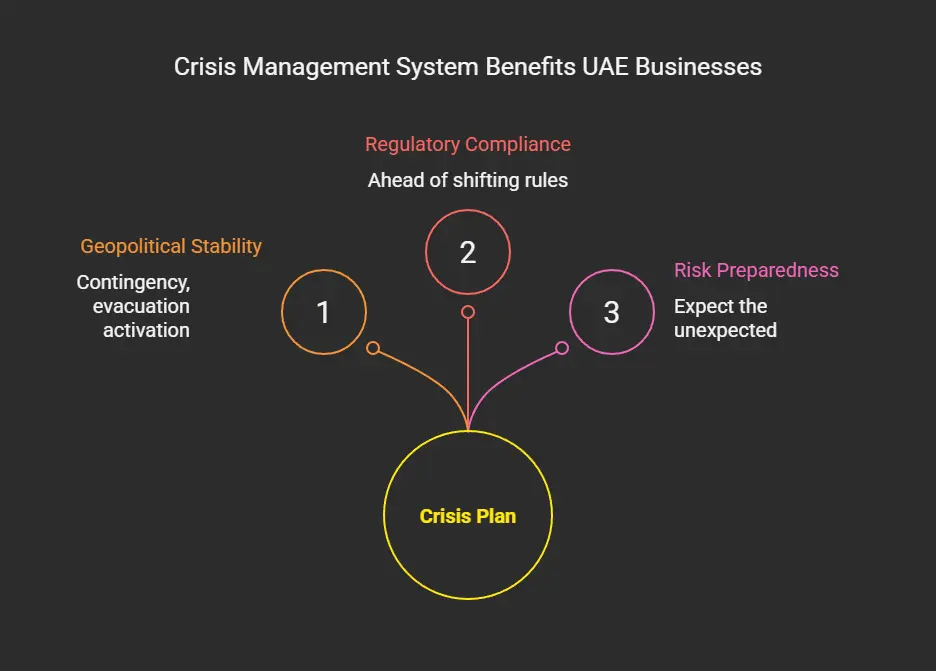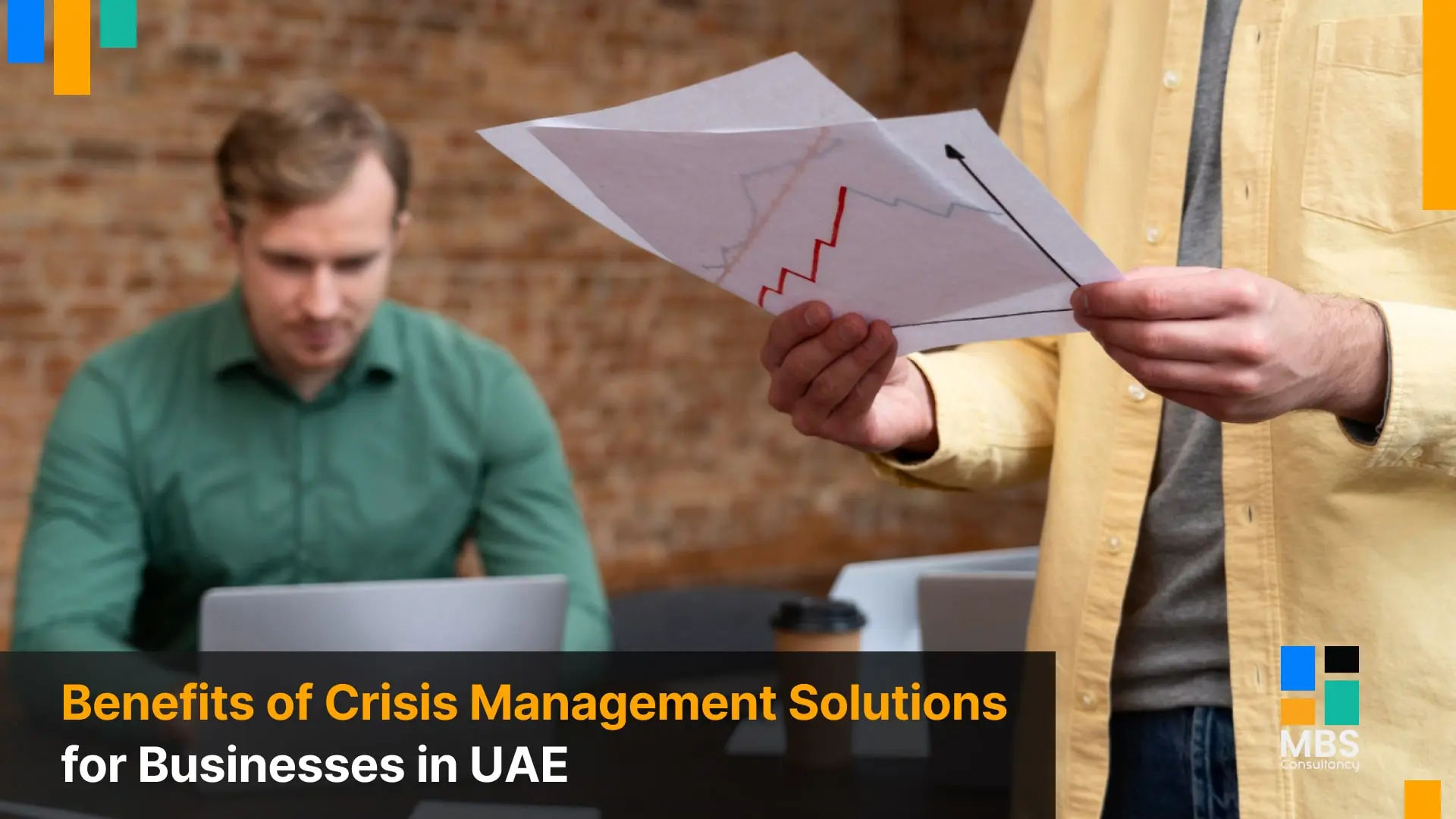Introduction: Why Smart Preparedness Matters in the UAE
Imagine calm water in Dubai Marina suddenly churning under unexpected storm waves, without warning. That’s how a crisis hits a thriving business here. But companies that prepare with clever systems surf those waves rather than sink.
The global uncertainty is rising with each passing year. UAE businesses will reap real power by planning ahead. Crisis management solutions don’t just reduce risk. But they build trust and boost confidence. The way to ensure you’re ready to seize opportunity even amid disruption.
The article is written to deep dive into what crisis management is, its key benefits, and why it is essential to have a crisis management system running in your company.
What Does “Crisis Management Solution” Mean for UAE Companies?
Think of it as your rise‑and‑shine toolkit when trouble appears. Crisis management solutions are tools that guide you step by step. It can be in the form of platforms and software. It consists of a team trained to act fast, with clarity and purpose. A clear communication plans that keep everyone informed, inside and outside. It provides a roadmap tailored for your local market, culture, and rules.
Many advanced platforms have launched in early 2026. This includes Noggin 2.0, which supports the full lifecycle, from planning and testing to recovery on secure, cloud-based systems.
Five Key Benefits of Crisis Management Solutions in the UAE
The following are the top benefits of crisis management solutions that are offered to companies that have adopted them.
1. Enhance Regulatory Compliance and Avoid Fines
In 2026, NCEMA (the UAE’s national crisis authority) enforced ISO 22301 standards more strictly. Firms in vital sectors like finance, energy, and healthcare now face audits and fines up to AED 500,000 if they fail to test business continuity plans. Using accredited solutions helps you secure ISO 22301 alignment.
It aids you in meeting NCEMA audits and preparing annual cybersecurity assessments. This way, you can avoid hefty penalties.
2. Reduce Disruption and Protect Reputation
Fast response matters. When companies prepare, they keep operations running, even under intense pressure. Their presence eliminates chaos in public messaging. They maintain customer trust, reputation, and brand value.
A 2024 example: Noon handled a cyber-incident transparently, issued updates every 12 hours, and gave affected users store credit. This turns a crisis into a confidence-builder. Similarly, Emirates Airlines responded swiftly during airspace closures, using SMS alerts and instant rebooking to preserve traveler trust
3. Strengthen Team Readiness and Collaboration
Strong crisis platforms help you to assign clear roles, whether it is executive, operations, HR, media, or IT. You can better conduct regular drills and tabletop exercises. It helps refine response plans by learning from each rehearsal.
One Dubai healthcare provider took 45 minutes to respond to ransomware in 2024, thanks to assigned teams and ready templates. It protects patient trust and avoids legal fallout.
4. Improve Supply Chain Resilience
In the UAE, imports dominate supply chains. A supply disruption holds up your whole business. Crisis platforms help you map vulnerabilities across suppliers. You can build backup sources and safety stock. It provides a way to test alternative routes and logistics in simulations. Leveraging it helps you in communicating seamlessly if a disruption occurs.
5. Leverage Advanced Tools and AI
At the Abu Dhabi crisis-tech exhibition in early April 2026, platforms like Falcon (an AI decision tool) and Centurion (real‑time threat detection) debuted to powerful applause. Noggin 2.0 showed how cloud‑based platforms connect planning, monitoring, response, and recovery smoothly.
Quick Snapshot: Benefits at a Glance
We have also crafted a crisis management plan in the form of a table to help you better understand its advantages.
| Benefit | How It Helps |
| Regulatory Safety | Meets NCEMA audits, ISO 22301 compliance, avoid fines |
| Reputation Protection | Quick communication saves public trust during disruption |
| Operational Continuity | Limits downtime, safeguards operations even under pressure |
| Team Confidence | Staff know their roles, act quickly, stay calm, and are capable |
| Supply Chain Flexibility | Enables backup suppliers, better logistics planning |
| Tech-Driven Access | AI tools speed up decisions, simplify cross‑team coordination |
Build a UAE‑Focused Crisis Management Strategy in 2026
Here’s a hands-on plan to bring these benefits to life:
Step 1 – Identify Your Top Threats
Think about your sector. Is it an E‑commerce? Then, prioritize data theft and cyber attacks. Hotel or guest services? Focus on safety risks and brand damage. Fintech or healthcare? Watch for legal/regulatory disruptions.
Limit your drills to the top 3 digital threats, the top 2 reputation/legal scenarios, and one emergency scenario. It could be fire, supply breakdown, and visa issues.
Step 2 – Form Your Crisis Team
Include the executive Lead, operations Head, HR Person, media/Communication Handler, and IT Security Officer. Make sure each knows their backup and authority level.
Step 3 – Prepare Messaging Templates
Draft templates for customer alerts, staff updates, press releases, and social and social-channel messaging. Store them in a secure, shared cloud drive.
Step 4 – Run Regular Drills
Simulate crises quarterly and adjust the test decision-making speed. Check communication flow and update contact info and escalation paths.
Step 5 – Embed Tech Tools
Pick a platform that offers crisis dashboards and alerts. Check if the offer includes real-time monitoring dashboards and communication workflows. It must have AI decision-support and recovery tracking, and action plans.
Step 6 – Train, Learn, Repeat
After each exercise or incident, review what went well and what didn’t. Must revise roles, messages, and communication flows. Train new staff and refresh veteran staff
Why It Matters in Today’s UAE Context
Thinking? Why does it matter today to have a crisis management system in your business? The following are some of the reasons that highlight its importance.

➤ Geopolitical Uncertainty
Recent unrest in the region, such as Israel‑Iran tensions, pushed Gulf firms to activate contingency plans and evacuation protocols. Advisors like Kroll, Control Risks, and International SOS saw surging demand from firms in Dubai and Abu Dhabi to protect staff and assets. Having a crisis plan meant companies stayed calm and proactive.
➤ Rising Regulatory Strictness
NCEMA’s 2024 BCMS updates raised penalties and compliance standards. By 2026, audit readiness and continuity testing orders apply to banks, healthcare providers, logistics firms, and energy companies alike. Crisis solutions help you stay ahead of shifting rules.
➤ Regional Focus on Risk Management
A late Jan 2026 Gulf-region survey by FTI Consulting found that only one-third of organizations felt well-placed to handle reputation or environment‑related crises. Yet 68% already had contingency plans in place. It is higher than the global average. Crisis tools boost preparedness and shift your mindset to expect the unexpected.
Real‑World UAE Success: Who’s Leading the Way?
- MBS Consultancy offers tools and resources. You can use this software to create strategies that lead you to succeed in the market.
- Noon tackled a cyber breach transparently, boosting trust through updates and compensation in 2024
- Emirates Airlines handled sudden airspace closures by activating real-time travel alerts and rebooking. This keeps travellers informed and calm
- A Dubai healthcare provider responded to ransomware in under 45 minutes. Thanks to pre-assigned roles and tested message templates
- Noggin 2.0 and other platforms launched in 2026 offer cloud-based, end-to-end crisis management capabilities to UAE firms seeking modern tools
Why Now Is the Time to Act
- Stronger local rules — NCEMA’s audits and fines make readiness non‑optional.
- Global instability — Regional geopolitical risk raises urgency and unpredictability.
- New tools arrive — AI platforms now work faster and smarter than ever.
- Customer expectations shift — Clients now trust firms that communicate openly in crisis.
- Investors value resilience — Strong continuity plans attract funding and partnerships.
Final Thoughts
In the UAE’s fast‑moving business world in 2026, crisis management has shifted from “nice to have” to “must‑have.” The benefits aren’t just avoiding loss. But they’re building a reputation, drawing trust, and creating a safety net that drives confidence.
Companies that shine use tested frameworks, a trained crisis management team, and tools like Noggin 2.0, Falcon, or Centurion to meet standards and stay ready.
If you’re ready to turn disruption into advantage, crisis‑ready plans and platforms are your launchpad to stronger growth, smoother operations, and lasting client loyalty.
Want to get tailored help for crisis management solutions? Reach out to MBS consultants today. We’ll closely look into your business needs and offer a solution that fits well with your business goals.




